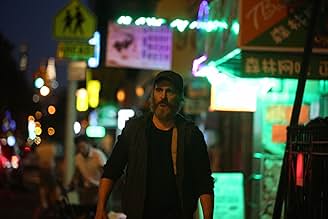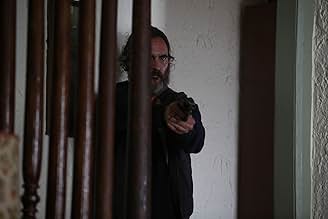A traumatized veteran unafraid of violence tracks down missing girls for a living. When a job spins out of control, Joe's nightmares overtake him as a conspiracy is uncovered leading to what... Read allA traumatized veteran unafraid of violence tracks down missing girls for a living. When a job spins out of control, Joe's nightmares overtake him as a conspiracy is uncovered leading to what could be his death trip or his awakening.A traumatized veteran unafraid of violence tracks down missing girls for a living. When a job spins out of control, Joe's nightmares overtake him as a conspiracy is uncovered leading to what could be his death trip or his awakening.
- Director
- Writers
- Stars
- Nominated for 1 BAFTA Award
- 24 wins & 78 nominations total
- Director
- Writers
- All cast & crew
- Production, box office & more at IMDbPro
6.7134K
1
2
3
4
5
6
7
8
9
10
Featured reviews
Don't wait to see Joker, Joaquin already brought his "A" game!
Joe (Joaquin Phoenix) is a man you hire to track down missing people. Joe is also a skilled ex veteran who is permanently traumatised by his dark past. When Joe works, he walks around with confidence and has no problems using violence in order to get the job done. After getting the job done and collecting his pay, Joe comes home to his elderly mother who he takes care of.
After completing a recent job, Joe is soon offered a new mission from a New York senator. The mission is to find and rescue the Senator's 13 year old daughter who may have been captured.
I enjoyed the fact that Joe as a character is no 007. It's clear that while he is skilled, he's also a man with a horrible past, but in the end... he is very capable for any task. To the audience, we feel Joe does what he does to distracts himself or perhaps occupy to his thoughts from dwelling on his own personal hell.
The film is loaded with tension, but to my surprise it's also all shot beautifully. When Joe is on a mission, we don't do see the smashing and bashing. The director here gives us enough understanding to know what Joe is doing each step of the way without needing to show us every single detail. Other scenes are filmed creatively, allowing us to see Joe's mind and thoughts. These scenes can come across like a dream sequence and viewers might possibly find this slow and boring. Others may lock into what we see of Joe's world and be thankful for how much we get to see of his personal life. For me personally, I loved how creative this film was. Showing different camera angles and Joe's mind in depth only helped me to gain greater understanding of the situation and the characters. Naturally it's these types of moments that also build the suspense!
From a performance level I loved Joaquin Phoenix. While I understand the actor has kept himself busy on screen, I personally enjoyed his work here more than anything else I've seen of him recently. The actress of the 13 year old victim (actress Ekaterina Samsonov) also acts incredibly and provides perfect screen chemistry with Joaquin Phoenix's character. I personably enjoyed seeing these two work together as the story built up.
Overall, I found this film rather surprising in a positive way. The film is dark, gritty and loaded with tension as it progresses, but we also gain a greater understanding to Joe's thoughts and his mind. We are given plenty of creative detail thanks to the awesome work from the director. That being said, I feel many will enjoy the film's creativity while others might start to look at their watch during the film. For me, I loved it, and it was great to see something new and fresh in 2018 with yet another solid performance from actor Joaquin Phoenix. Worth a look!
8.2/10 Walkden Entertainment
After completing a recent job, Joe is soon offered a new mission from a New York senator. The mission is to find and rescue the Senator's 13 year old daughter who may have been captured.
I enjoyed the fact that Joe as a character is no 007. It's clear that while he is skilled, he's also a man with a horrible past, but in the end... he is very capable for any task. To the audience, we feel Joe does what he does to distracts himself or perhaps occupy to his thoughts from dwelling on his own personal hell.
The film is loaded with tension, but to my surprise it's also all shot beautifully. When Joe is on a mission, we don't do see the smashing and bashing. The director here gives us enough understanding to know what Joe is doing each step of the way without needing to show us every single detail. Other scenes are filmed creatively, allowing us to see Joe's mind and thoughts. These scenes can come across like a dream sequence and viewers might possibly find this slow and boring. Others may lock into what we see of Joe's world and be thankful for how much we get to see of his personal life. For me personally, I loved how creative this film was. Showing different camera angles and Joe's mind in depth only helped me to gain greater understanding of the situation and the characters. Naturally it's these types of moments that also build the suspense!
From a performance level I loved Joaquin Phoenix. While I understand the actor has kept himself busy on screen, I personally enjoyed his work here more than anything else I've seen of him recently. The actress of the 13 year old victim (actress Ekaterina Samsonov) also acts incredibly and provides perfect screen chemistry with Joaquin Phoenix's character. I personably enjoyed seeing these two work together as the story built up.
Overall, I found this film rather surprising in a positive way. The film is dark, gritty and loaded with tension as it progresses, but we also gain a greater understanding to Joe's thoughts and his mind. We are given plenty of creative detail thanks to the awesome work from the director. That being said, I feel many will enjoy the film's creativity while others might start to look at their watch during the film. For me, I loved it, and it was great to see something new and fresh in 2018 with yet another solid performance from actor Joaquin Phoenix. Worth a look!
8.2/10 Walkden Entertainment
Shadows and Light: 'You Were Never Really Here' - A Haunting Dance of Violence and Redemption
In the realm of cinematic artistry, Lynne Ramsay's "You Were Never Really Here" emerges as a film that defies the conventional boundaries of its genre. It is a film that, with its dreamlike cadence and haunting visual poetry, captures the viewer in a grip as tight and compelling as the narrative it unfolds.
Joaquin Phoenix delivers a performance of such raw intensity that it becomes the beating heart of the film. His portrayal of Joe, a man whose life is a mosaic of trauma and violence, is both a towering achievement and a deeply human one. Phoenix's Joe is a man of few words, but each silence speaks volumes, each glance carries the weight of a thousand emotions. He is the weary titan of this story, carrying the burdens of his past with a stoicism that is as heartbreaking as it is admirable.
Ramsay's direction is nothing short of masterful. She weaves a tapestry of images and sounds that are as beautiful as they are disturbing. The film's score, a dissonant symphony by Jonny Greenwood, is accentuating the film's atmosphere of disquiet. The cinematography is a chiaroscuro of the soul, painting each scene with the shades of Joe's turbulent inner world.
The narrative structure of "You Were Never Really Here" is a bold choice. Ramsay opts for an elliptical storytelling style that mirrors the fragmented psyche of its protagonist. This choice is both the film's greatest strength and its most significant challenge to the viewer. The plot does not unfold; it reveals itself in shards, each piece a glimpse into the abyss that Joe stares into every day.
However, this very narrative choice may also be where the film falters for some. The disjointed nature of the storytelling, while thematically resonant, can at times leave the audience grasping for a thread to hold onto. The film demands attention and patience, and not all viewers are willing to give it the concentration it requires.
The violence, while never gratuitous, is visceral and unflinching. It serves the story, but it also runs the risk of alienating those with a more sensitive disposition. The film's resolution, too, may strike some as abrupt, leaving a lingering question as to the ultimate fate of its characters.
"You Were Never Really Here" is a film that, like its protagonist, is not easily forgotten. It is a challenging, evocative piece of cinema that dares to delve into the darkness of the human condition. While it may not find universal acclaim due to its unconventional approach and somber themes, it stands as a testament to the power of visual storytelling and the enduring strength of a well-crafted character study.
Joaquin Phoenix delivers a performance of such raw intensity that it becomes the beating heart of the film. His portrayal of Joe, a man whose life is a mosaic of trauma and violence, is both a towering achievement and a deeply human one. Phoenix's Joe is a man of few words, but each silence speaks volumes, each glance carries the weight of a thousand emotions. He is the weary titan of this story, carrying the burdens of his past with a stoicism that is as heartbreaking as it is admirable.
Ramsay's direction is nothing short of masterful. She weaves a tapestry of images and sounds that are as beautiful as they are disturbing. The film's score, a dissonant symphony by Jonny Greenwood, is accentuating the film's atmosphere of disquiet. The cinematography is a chiaroscuro of the soul, painting each scene with the shades of Joe's turbulent inner world.
The narrative structure of "You Were Never Really Here" is a bold choice. Ramsay opts for an elliptical storytelling style that mirrors the fragmented psyche of its protagonist. This choice is both the film's greatest strength and its most significant challenge to the viewer. The plot does not unfold; it reveals itself in shards, each piece a glimpse into the abyss that Joe stares into every day.
However, this very narrative choice may also be where the film falters for some. The disjointed nature of the storytelling, while thematically resonant, can at times leave the audience grasping for a thread to hold onto. The film demands attention and patience, and not all viewers are willing to give it the concentration it requires.
The violence, while never gratuitous, is visceral and unflinching. It serves the story, but it also runs the risk of alienating those with a more sensitive disposition. The film's resolution, too, may strike some as abrupt, leaving a lingering question as to the ultimate fate of its characters.
"You Were Never Really Here" is a film that, like its protagonist, is not easily forgotten. It is a challenging, evocative piece of cinema that dares to delve into the darkness of the human condition. While it may not find universal acclaim due to its unconventional approach and somber themes, it stands as a testament to the power of visual storytelling and the enduring strength of a well-crafted character study.
Unconventional at it's finest
Yes I am aware that many thought this film was slow. However, it the slow and thoughtful burn of this film that makes it so unique and well done. It is, overall, a story about trauma and how this trauma has afflicted the protagonist. This is what trauma looks like. I already loved it but could further appreciate it after viewing a video by screened titled " How to Show Trauma" Just watch this video and then decide for yourself. Everything about this film was very much intentional and for good reason.
A PTSD filled drama
Probably the strangest movie I've seen in a while... It's hard to describe the feeling you get when you finish this film. The best way I can say is; there could have been more. It kind of ends on a bittersweet note, and it will piss off some, that is for sure. Overall though, it does a good job of showing how a traumatized man views the world. One word that sums up this movie would be PTSD. The film essentially is a PTSD fest. Throughout it's 1h30 runtime you aren't sure if what you're seeing is actually happening for real.
Incredible performances and cinematography, but has a weak uninteresting plot
I'm a huge fan of art films. This film is definitely inspired by taxi driver and that's one of the reasons why it caught my attention as I love that movie, but this film is a huge let down. It's not good. The acting is 10/10, the cinematography and camerawork is 10/10, but the plot is horrible and boring. Take blade runner 2049's slow (but awesome) pacing and slow it down, throw in an uninteresting predictable repetitive recycled plot we've seen a billion times which could have been told within 20 minutes, give the main character psychological traumatic issues and show us random crap that's going on in his mind, and you have this movie. It brings nothing new to the table and is done in a way that simply bores you. I love dramas, I know this movie is one, an art drama film, but there Wonder, no suspense, no clever conversations, no anything really. I felt like I was watching a long video demonstrating Joaquin Phoenix's phenomenal acting.
In a nutshell this film is a drama with your typical basic story line with phenomenal acting that you will forget within a couple of days. I can only recommend it if love movies with beautiful cinematography and are a huge fan of Joaquin Phoenix, but if you're looking for an original unforgettable drama, a crime revenge film, or whatever else you were expecting, I recommend staying away from this.
In a nutshell this film is a drama with your typical basic story line with phenomenal acting that you will forget within a couple of days. I can only recommend it if love movies with beautiful cinematography and are a huge fan of Joaquin Phoenix, but if you're looking for an original unforgettable drama, a crime revenge film, or whatever else you were expecting, I recommend staying away from this.
Soundtrack
Preview the soundtrack here and continue listening on Amazon Music.
Did you know
- TriviaAccording to the director Lynne Ramsay, the scene where Joaquin Phoenix's character lies down on the floor next to the agent and begins singing was improvised by Phoenix.
- GoofsScott gives the security code as 4392, but the first number we see Joe punching is on the upper right of the keypad.
- Crazy creditsThe indistinct conversation from the diner continues through the end credits, even when the music changes.
- ConnectionsFeatured in WatchMojo: Top 10 Amazing Movies You Missed This Spring (2018)
- How long is You Were Never Really Here?Powered by Alexa
Details
- Release date
- Countries of origin
- Official sites
- Language
- Also known as
- Nunca estarás a salvo
- Filming locations
- Astoria, Queens, New York City, New York, USA(Elevated subway platform)
- Production companies
- See more company credits at IMDbPro
Box office
- Budget
- $2,500,000 (estimated)
- Gross US & Canada
- $2,528,078
- Opening weekend US & Canada
- $132,829
- Apr 8, 2018
- Gross worldwide
- $9,360,514
- Runtime
- 1h 29m(89 min)
- Color
- Sound mix
- Aspect ratio
- 2.39 : 1
Contribute to this page
Suggest an edit or add missing content






































